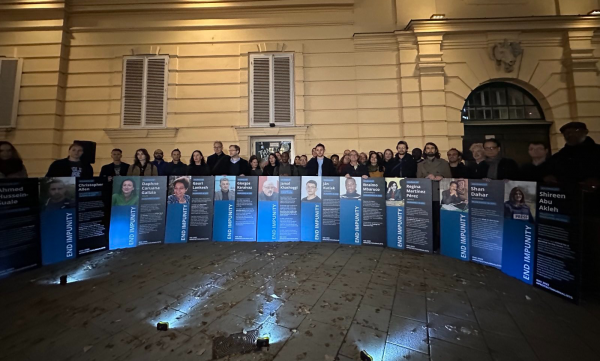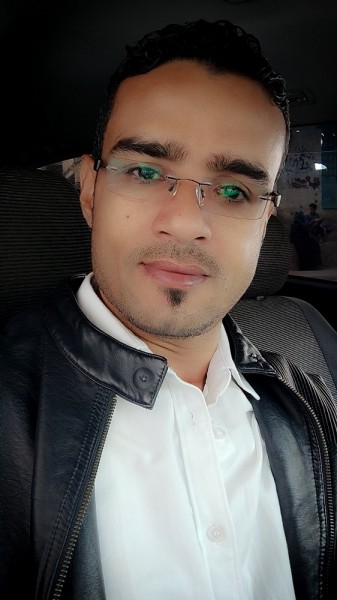Feb. 27, 2012 marked the symbolic transition of power in Yemen from former President Ali Abdullah Saleh to newly-elected President Abed Rabbo Mansour Hadi. Massive demonstrations and uprisings beginning in Jan. 2011 brought about the change of power from Saleh to Hadi, illustrating the peoples’ desire for democracy. The end of Saleh’s 33-year-long dictatorship ushered in great waves of optimism among media professionals, as they hoped for a greater commitment to press freedom from the new government. But a hostile climate of lawlessness and impunity continues to endanger journalists who have already been subject to widespread attacks, harassment and censorship.
The continued imprisonment of prominent Yemeni journalist Abdul Elah Haider Shaye illustrates not only the poor state of press freedom in Yemen but also the danger for independent journalists reporting on politically sensitive topics such as corruption, terrorist networks and ongoing civil conflicts.
Abdul Elah Haider Shaye gained international attention for his groundbreaking report for the state-run Saba news agency on the Dec.17, 2009, bombing of Al Majallah village in southern Yemen. He was the first to report that the attack at Al Majallah was not in fact conducted by the Yemeni air force, as the government claimed, but was carried out by American drones. Upon visiting Al Majallah, Shaye found indisputable evidence that the weapons used to carry out the attack were “Made in the USA”, and evidence of U.S. covert action in Yemen.
More importantly, Shaye reported that the bombing was not the success story that both the Yemeni and U.S. governments had reported it to be. While the official narrative said 34 Al Qaeda militants had been killed, in reality 14 children and 21 women lost their lives in the attack.
Shaye focused his journalistic work on terrorism-related cases, conducting multiple interviews with a wide range of militants, tribesmen and leading officials in known terrorist cells throughout the Arabian Peninsula, the Al Jazeera network reported.
In 2009, Shaye obtained an exclusive interview with top Al Qaeda official Anwar al-Awlaqi for the Al Jazeera network. In July 2010, Shaye was abducted and detained by Yemeni security forces and questioned for his reporting on Al Qaeda within Yemen. By August he had been arrested for allegedly supporting the Al Qaeda terrorist network, accused of recruiting new members to the organisation and acting as a media advisor to al-Awlaqi himself.
Shaye was convicted in January 2011 by the Specialized Criminal Court for Terrorism and sentenced to up to five years in prison. His body reportedly showed signs of torture during his trial. In a turn of events, former President Saleh was prepared to release Shaye with a presidential pardon along with a score of other journalists convicted by the court – but on Feb. 2, 2011, the day before Shaye’s anticipated release, United States President Barack Obama reportedly phoned Saleh with “concerns” surrounding Shaye’s pardon. Shaye was the only journalist not pardoned and has been serving his sentence ever since.
International press freedom groups, human rights organisations, and journalists have strongly protested the continued imprisonment of Shaye and demand his release. “Abdul Elah Shaye is still in jail despite the weekly demonstrations organized by the Yemeni Journalists Syndicate,” Shatha al-Harazi, a political and human rights journalist for The Yemen Times, told IPI. “President Hadi has promised to handle Shaye’s issue many times but the same pressure that was put on Saleh by the American administration to keep Shaye jailed is the same on Hadi,” she later added.
In addition, Sadeq al-Wasebi, a reporter for the same newspaper, said, “Our Yemeni Journalists Syndicate has no power to release him. They’ve tried to put pressure on the government and the American Embassy to release Shaye, but these attempts have failed. The decision of his release is not in our hand, it’s in the hand of President Obama.”
Shaye’s coverage of Al-Qaeda activities appears to be the basis for the prosecution against him. As Shaye said during his trial, “All of my journalistic contributions and quotations to international reporters and news channels have been turned into accusations.” In a country where independent media outlets are few, his case has chilled other journalists’ reporting on politically sensitive topics such as Al Qaeda cells in Yemen, journalists told IPI. Shaye has said that he was only doing his job as a journalist and argued that the very court that convicted him had no legal basis.
Reports from international press freedom organisations and human rights groups seem to indicate that Shaye remains imprisoned at the behest of the United States, a highly unusual case for journalists. When asked to comment on Shaye’s imprisonment, U.S. Ambassador to Yemen Gerald Feierstein told freelance journalist Iona Craig: “Shaye is in jail because he was facilitating Al Qaeda and its planning for attacks on Americans and therefore we have a very direct interest in his case and his imprisonment.” He later added: “This isn’t anything to do with journalism, it is to do with the fact that he was assisting Al Qaeda in the Arabian Peninsula and if they [Yemeni journalists] are not doing that they don’t have anything to worry about from us.”
Shaye’s imprisonment has not only increased the level of self-censorship among journalists who fear retaliation from both the Yemeni and U.S. government, but has also brought criticism upon the Obama administration for its central role in his continued imprisonment.
“The United States encourages the Freedom of the Press both in America and abroad — at least they claim. But in actuality, the Obama administration is going out of their way to keep journalists from exposing the truth,” Jeremy Scahill wrote in his book, Obama after Whistleblowers Worldwide.
Fear of prosecution under anti-terror laws has not only worried Yemeni journalists, but Americans as well. But while journalists in the United States recently successfully challenged a law that could potentially have resulted in their detention as suspected terrorists, Yemen’s outdated press laws offer less-than-stellar protections of journalistic freedom.
On Wednesday May 16, a federal judge in New York reaffirmed the exercise of First Amendment rights by American citizens in a ruling against the ‘indefinite detention’ of U.S. nationals suspected of terrorist activity under the National Defense Authorization Act (NDAA). The law, signed by U.S. President Barack Obama in December 2011, allows the government to indefinitely detain, prosecute, and interrogate any U.S. citizen who is suspected of “substantially” or “directly” supporting terrorist organisations abroad or at home.
U.S. District Judge Katherine Forrest determined that the law was too vague and overly broad, and could allow infringements of civil and political rights. “An individual could run the risk of substantially supporting or directly supporting an associated force without even being aware that he or she was doing so,” Forrest wrote.
American journalists feared that interviews conducted abroad with members of terrorist organizations could be seen as ‘substantial support’ for terrorist activities and thus incriminate them, blurring the line between what is and what is not protected under the right to freedom of speech. Christopher Hedges, senior fellow at the Nation Institute and winner of the Pulitzer Prize in 2002, filed the suit challenging the NDAA along with six others. Hedges has interviewed several members of Al Qaeda and the Taliban, in addition to reporting on 17 groups recognised by the State Department as known terrorist organizations. In an online interview with Democracy Now!, Hedges said he was fearful that journalists will not be exempt from this law and therefore could face indefinite detention for their work.
The U.S. District Court level ruling represents a first battle won for American journalists, but in Yemen, where the fight against terror is much closer to home and the country’s list of needs much longer, several journalists remain in prison for their work covering terrorism.
Although Article 41 of the Yemen Constitution guarantees press freedom and freedom of expression “within the limits of the law,” according to a translation on Al-Bab.com, a repressive 1990 Press and Publications Law has been widely used by the government to prosecute journalists. Article 103 of the 1990 law prevents journalists from criticising the head of state or publishing any material that defames the image of Yemeni, Arab, or Islamic heritage. Article 104 states that anyone found violating media laws may be imprisoned for up to one year, or fined.
Two specialised courts exist to try media related offenses. They include the Specialized Criminal Court, established in 1999 to prosecute cases related to terrorism and piracy, and the Specialized Press and Publications Court established in 2009 to enforce press laws. These courts are extremely controversial as the Yemeni constitution prohibits the creation of “exceptional courts…under any conditions,” reported Freedom House. According to their 2011 annual Press Freedom report, numerous journalists were prosecuted under terrorism charges in 2011.
President Hadi has committed Yemen to increasing its fight against Al-Qaeda cells, stating that “continuing the war against al-Qaeda is a national and religious duty,” news reports stated.
“In addition to the political crises, the government is fighting al-Qaeda and seeking to unify and reform the military,” Hakim Almasmari, chief editor of the Yemen Post, told IPI. “Press freedom is at the end of the list of priorities when it comes to change and reform in Yemen.” Journalists in Yemen operate in a state of fear, journalists told IPI, a reality that has not changed in the post-Saleh era.
“We still see that the new regime is trying to use the same oppressive techniques but doing so in a developed manner. Journalists still fear they are under threat and are not safe,” said Hakim Almasmari. “Some journalists were subjected to torture or kidnapping over the last six months. The uprising has not been very fruitful when it comes to press freedom, at least not yet.”
Attacks against journalists and independent media outlets continue even under the new government, with news media and press freedom groups detailing numerous physical attacks and prosecutions.
According to a summary of recent press freedom violations compiled by the Paris-based group Reporters Without Borders, multiple attacks on journalists and media houses have been carried out in recent weeks. Local journalists for Al Jazeera, Ahmed Al-Shalafi and Hamdi Al-Bokari, are facing trial for covering anti-government uprisings that occurred in March 2011. Authorities withdrew the accreditation of all Al Jazeera’s journalists in April 2011. Anwar Al-Bahri, a news editor with the state run news agency Saba, was beaten at his home in front of his wife and children on Apr. 30, 2012. Additionally, a campaign against Al-Ahali and Akhbar Alyawm newspapers has caught the attention of various international press freedom groups. Several journalists have said they were threatened, in some cases by officials.
According to the Sanaa-based Freedom Foundation, by May 3, 2012, 81 violations against media personnel and agencies had been recorded since the beginning of 2012, including “attacks, arrests, seizure, threats, arbitrary dismissal, abduction, confiscation of newspapers, attempts of murder as well as other abuses.” Several journalists have also accused of aiding Al-Qaeda operatives, Freedom Foundation said.
The previous government seriously undermined the development of a strong independent media through draconian laws, official censorship (although this practice was denied), and widespread control over print and broadcast media, according to a report issued by press freedom organization Article 19.
What remains to be seen is whether Yemen’s new leaders will have the strength and the will to combat these problems by punishing those who threaten and attack journalists, including officials, end the practice of seizing newspapers, and make sure journalists are not prosecuted or jailed for doing their jobs.
Almasmari was not hopeful. “Powerful newspapers in Yemen were seized for days because they sought change. The official Al-Thawra, Al-Joumhuria newspaper staffs were attacked and threatened by old regime gunmen. Nothing was done to help them,” he said. “This clearly shows the failure of the new government in protecting [even] its official media outlets and therefore, how could anyone expect this government to protect media outlets or journalists in general.”


